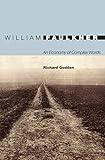William Faulkner : An Economy of Complex Words / Richard Godden.
Material type: TextSeries: 20/21Publisher: Princeton, NJ : Princeton University Press, [2009]Copyright date: ©2007Edition: Course BookDescription: 1 online resourceContent type:
TextSeries: 20/21Publisher: Princeton, NJ : Princeton University Press, [2009]Copyright date: ©2007Edition: Course BookDescription: 1 online resourceContent type: - 9780691130712
- 9781400827916
- 813.52 22
- PS3511.A86Z78342 200
- online - DeGruyter
- Issued also in print.
| Item type | Current library | Call number | URL | Status | Notes | Barcode | |
|---|---|---|---|---|---|---|---|
 eBook
eBook
|
Biblioteca "Angelicum" Pont. Univ. S.Tommaso d'Aquino Nuvola online | online - DeGruyter (Browse shelf(Opens below)) | Online access | Not for loan (Accesso limitato) | Accesso per gli utenti autorizzati / Access for authorized users | (dgr)9781400827916 |
Frontmatter -- Contents -- Acknowledgments -- Introduction -- Chapter 1. Earthing The Hamlet -- Chapter 2. Comparative Cows: Reading The Hamlet for Its Residues -- Chapter 3. Revenants, Remnants, and Counterrevolution in "The Fire and the Hearth" -- Chapter 4. "Pantaloon in Black" and "The Old People": Migration, Mourning, and the Exquisite Corpse of African American Labor -- Chapter 5. Reading the Ledgers: Textual Variants and Labor Variables / Godden, Richard / Polk, Noel -- Chapter 6. Find the Jew: Modernity, Seriality, and Armaments in A Fable -- Chapter 7. "The Bugger's a Jew": A Fable as Melancholic Allegory -- Notes -- Index
restricted access online access with authorization star
http://purl.org/coar/access_right/c_16ec
In William Faulkner, Richard Godden traces how the novelist's late fiction echoes the economic and racial traumas of the South's delayed modernization in the mid-twentieth century. As the New Deal rapidly accelerated the long-term shift from tenant farming to modern agriculture, many African Americans were driven from the land and forced to migrate north. At the same time, white landowners exchanged dependency on black labor for dependency on northern capital. Combining powerful close readings of The Hamlet, Go Down, Moses, and A Fable with an examination of southern economic history from the 1930s to the 1950s, Godden shows how the novels' literary complexities--from their narrative structures down to their smallest verbal emphases--reflect and refract the period's economic complexities. By demonstrating the interrelation of literary forms and economic systems, the book describes, in effect, the poetics of an economy. Original in the way it brings together close reading and historical context, William Faulkner offers innovative interpretations of late Faulkner and makes a unique contribution to the understanding of the relation between literature and history.
Issued also in print.
Mode of access: Internet via World Wide Web.
In English.
Description based on online resource; title from PDF title page (publisher's Web site, viewed 08. Jul 2019)


